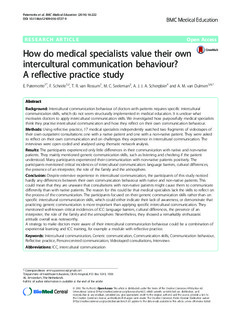| dc.contributor.author | Paternotte, Emma | |
| dc.contributor.author | Scheele, Fedde | |
| dc.contributor.author | Van Rossum, Tiuri R. | |
| dc.contributor.author | Seeleman, Conny M. | |
| dc.contributor.author | Scherpbier, Albert J.J.A. | |
| dc.contributor.author | van Dulmen, Sandra | |
| dc.date.accessioned | 2018-02-14T09:56:03Z | |
| dc.date.available | 2018-02-14T09:56:03Z | |
| dc.date.created | 2017-02-28T21:29:22Z | |
| dc.date.issued | 2016 | |
| dc.identifier.citation | BMC Medical Education. 2016, 16:222 1-9. | nb_NO |
| dc.identifier.issn | 1472-6920 | |
| dc.identifier.uri | http://hdl.handle.net/11250/2484551 | |
| dc.description.abstract | Background Intercultural communication behaviour of doctors with patients requires specific intercultural communication skills, which do not seem structurally implemented in medical education. It is unclear what motivates doctors to apply intercultural communication skills. We investigated how purposefully medical specialists think they practise intercultural communication and how they reflect on their own communication behaviour. Methods Using reflective practice, 17 medical specialists independently watched two fragments of videotapes of their own outpatient consultations: one with a native patient and one with a non-native patient. They were asked to reflect on their own communication and on challenges they experience in intercultural communication. The interviews were open coded and analysed using thematic network analysis. Results The participants experienced only little differences in their communication with native and non-native patients. They mainly mentioned generic communication skills, such as listening and checking if the patient understood. Many participants experienced their communication with non-native patients positively. The participants mentioned critical incidences of intercultural communication: language barriers, cultural differences, the presence of an interpreter, the role of the family and the atmosphere. Conclusion Despite extensive experience in intercultural communication, the participants of this study noticed hardly any differences between their own communication behaviour with native and non-native patients. This could mean that they are unaware that consultations with non-native patients might cause them to communicate differently than with native patients. The reason for this could be that medical specialists lack the skills to reflect on the process of the communication. The participants focused on their generic communication skills rather than on specific intercultural communication skills, which could either indicate their lack of awareness, or demonstrate that practicing generic communication is more important than applying specific intercultural communication. They mentioned well-known critical incidences of ICC: language barriers, cultural differences, the presence of an interpreter, the role of the family and the atmosphere. Nevertheless, they showed a remarkably enthusiastic attitude overall was noteworthy. A strategy to make doctors more aware of their intercultural communication behaviour could be a combination of experiential learning and ICC training, for example a module with reflective practice. | nb_NO |
| dc.language.iso | eng | nb_NO |
| dc.rights | Navngivelse 4.0 Internasjonal | * |
| dc.rights.uri | http://creativecommons.org/licenses/by/4.0/deed.no | * |
| dc.title | How do medical specialists value their own intercultural communication behaviour? A reflective practice study | nb_NO |
| dc.type | Journal article | nb_NO |
| dc.type | Peer reviewed | nb_NO |
| dc.description.version | publishedVersion | nb_NO |
| dc.rights.holder | The Author(s). 2016 | nb_NO |
| dc.source.pagenumber | 1-9 | nb_NO |
| dc.source.volume | 16:222 | nb_NO |
| dc.source.journal | BMC Medical Education | nb_NO |
| dc.identifier.doi | 10.1186/s12909-016-0727-9 | |
| dc.identifier.cristin | 1454812 | |
| cristin.unitcode | 222,56,1,0 | |
| cristin.unitname | Institutt for sykepleie- og helsevitenskap | |
| cristin.ispublished | true | |
| cristin.fulltext | original | |
| cristin.qualitycode | 1 | |

